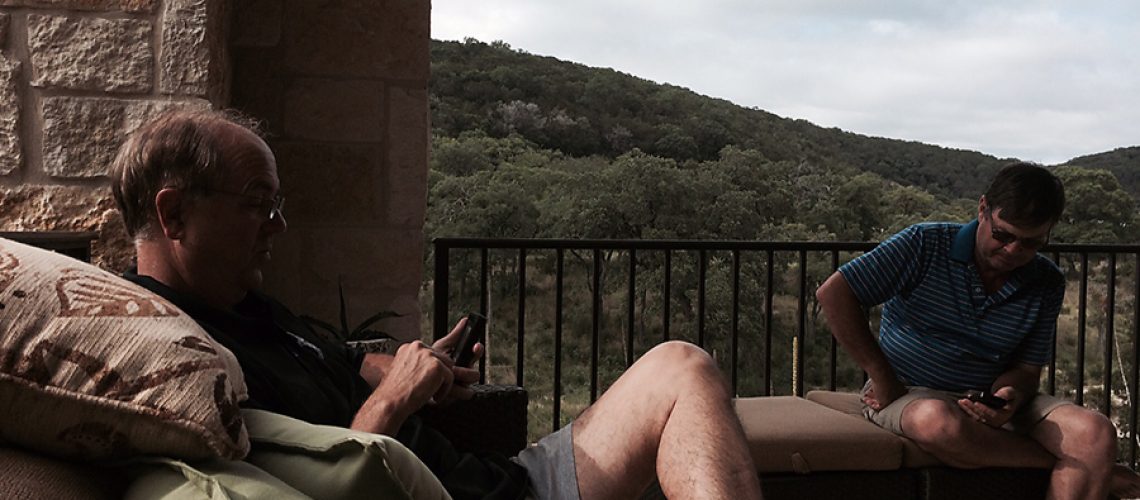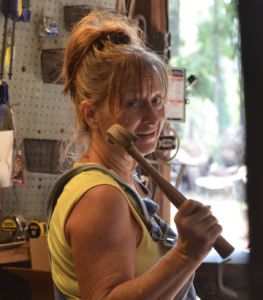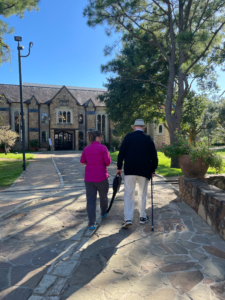It all started when we started talking about water.
The drought has started to let up in Texas and we’ve been having rain. Even central Texas and Lone Man Creek that winds through the valley that we were overlooking was full and green with algae.
Milton said something about the power and force of water when he’d seen it running through their little canyon this spring.
It made me think of the pipelines I’ve seen going up all over Houston and the surrounding area. Actually I should say going down.
From the farm down to within a block of our house, there has been a major effort in pipeline burial. It must be thousands of acres that somebody has leased or gotten the right to bring in huge equipment, dig through fences or yards and under roads and across bridges to lay three foot diameter blue plastic pipes in trenches that work crews have dug.
Weeks ago I stopped about a few miles from the farm and asked one of the crews what was going to go through the pipelines.
“I don’t know, ma’am,” he said not so politely. It was hot.I think he didn’t think I would get back into my truck. “I just dig holes,” he said and walked off.
Since that time and then again this Saturday morning I had been thinking how much goes on that we have no idea how it goes on or how it works or how it happens. There are natural things like the power of water when bottlenecked in a canyon to things we have designed, that although I see them, I have little idea about them.
I am guessing there are probably thousands of miles of pipeline in Texas, a heck of a lot of it right around Houston. How in the world does one move stuff through those? I mean, where is the dumping ‘in’ station? How do you get it out at the other end? Do you push it or pull it? I wouldn’t know how to get liquid moving through uneven territory over hundreds of miles.
It’s hydraulics. The whole idea has always fascinated me.
When I was my dad’s boy, before he had my brother, he used make me assist him as he ‘bled’ the brakes.
The idea is that my little foot, with my five year old butt sitting on the edge of the seat, would push the brake pedal to the floor, while Dad, under the automobile, closed the valve as the brake fluid streamed out. I held it that way until he exited from under his truck, poured more brake fluid into the reservoir under the hood, and then got back under giving me instructions on when to life my foot or depress again. The idea was that we were clearing the lines of air. Being hydraulic in design, the breaks worked only when the lines were filled with fluid and absolutely no air. He was watching for a solid stream exiting with no air bubbles.
So how do you get air out of thousands of miles of 3 foot diameter pipe or do you even need to?
The coffee conversation revealed that nothing of us really knew many of the answers.
So we googled.
And it was amazing.
As it turns out, there are a ton of underground pipes around Houston.
There have been for a while.
And you can tell what’s going to be going through them depending up on whether they are burying carbon steel, steel or plastic pipe. In the hazardous liquid pipelines, you can carry more than just one liquid, mixing them willy nilly. At the exit end, the mix is separated. “Pigs” are launched from pig launching stations along the pipeline and used to perform various maintenance operations. Some of them are smarter, (intelligent pigs, duh) and are used to detect anomalies in the pipe. Who does that? I mean where do you go to get trained on intelligent pipeline pig handling? It sounds like a good job to me.
Second cups of coffee and we moved on to liquified natural gas. Milton says it’s the future. Apparently if you chill natural gas down, way down (-260 F), it takes up about 1/600 the amount of space that it does in the gaseous state. 1/600. You can imagine why Milton, a gifted business man, thinks what he does. Imagine the ability to transport natural gas in liquid form.
As they sat and talked, and googled, I thought.
This is an amazing world we live in. And an amazing time.
For instance.
Your body houses a hydraulic system that spans 60,000 miles of vessels, equaling a distance of more than twice around the earth, using about 5 liters (each liter is about 1/4 of a gallon) volume.
In Germany there is a 5 kilometer long beer pipeline that serves the bars around a local soccer stadium.
There are people that know how to run intelligent pigs in pipelines and others who doctors who can fix valve issues in our circulatory systems.
My dad once asked me what I thought would happen if the world had to start over. Who would have the knowledge to get things done? That’s a scary thought. I hope it never happens. But one thing for sure, it’s wonderful to have the chance to ‘see’ and understand as much as we can.
I wish you your own Hays County Saturday Morning Coffee Conversations. Or reasonable facsimiles.And friends and family to explore and think with.






